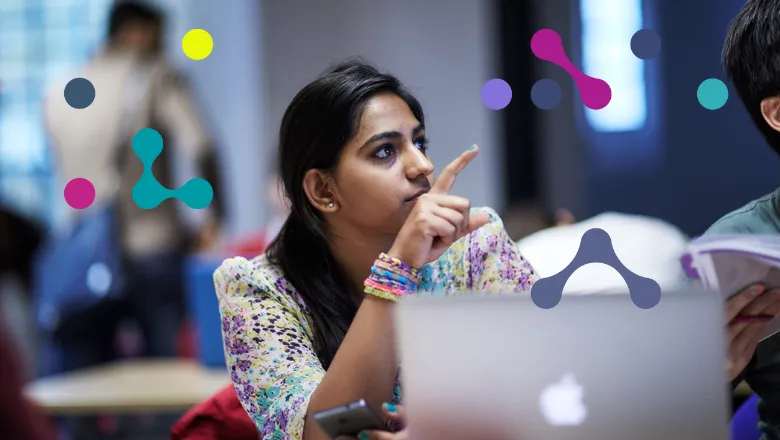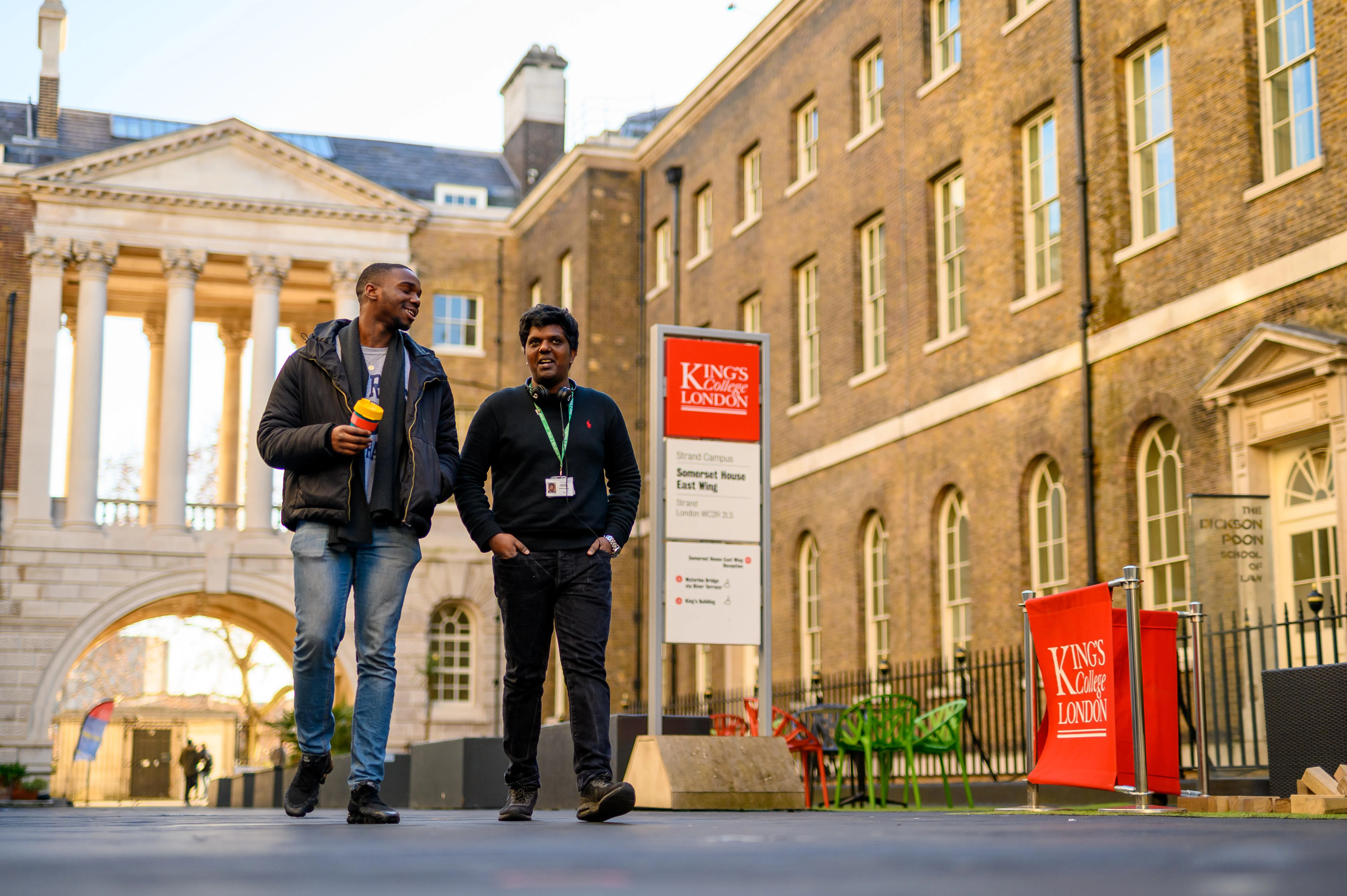Faculty of Natural, Mathematical & Engineering Sciences
The Faculty Office is based in the heart of London at Strand Campus
King’s College London is an internationally renowned university delivering exceptional education and world-leading research. We are dedicated to driving positive and sustainable change in society and realising our vision of making the world a better place. Through our commitment to exceptional education, impactful research, and genuine service to society, we are creating positive change in our communities, both in London and on the world stage. Our Vision 2029 looks forward to our 200th anniversary in 2029 and sets out our ambitious plans in five key areas: • Educating the next generation of change-makers; • Challenging ideas and driving change through research; • Giving back to society through meaningful service; • Working with our local communities in London; • Fostering global citizens with an international perspective. King’s comprises nine faculties, each with an academic leader and professional services lead: Executive Dean of Faculty and Director of Operations. Professional Services are provided in every Faculty as well as centrally to deliver support services for students and staff.
• Faculty of Arts & Humanities • Faculty of Dentistry, Oral & Craniofacial Sciences • Faculty of Life Sciences & Medicine • Faculty of Natural, Mathematical & Engineering Sciences • Faculty of Social Science & Public Policy • Florence Nightingale Faculty of Nursing, Midwifery & Palliative Care • Institute of Psychiatry, Psychology & Neuroscience • King’s Business School • The Dickson Poon School of Law
Delivering sustainable academic excellence
We are a vibrant faculty based in the heart of London with a long tradition of world-leading research and teaching in physics, mathematics, chemistry, computer science and engineering. Our internationally renowned scientists are working across traditional subject boundaries, leading cutting-edge research, tackling global challenges, and answering fundamental questions about our universe.
Reports to: Professor Rachel Bearon
A competitive salary commensurate with the academic profile and experience of the successful applicant will be offered.
• Head of Department of Informatics This appointment will be for 4 years in the first instance, on an additional and separate contract to that of the substantive appointment. With the potential for a subsequent renewal following a review process. • The substantive appointment is an ongoing academic contract, a permanent member of the academic staff of King’s College London. It is expected, but not a requirement, that the appointee will meet the criteria for an appointment at professorial level.
Full time (35 hours per week)
Strand Campus
06 May 2025 23:59
111365

The main purpose of the role of Head of Department is: • To provide strategic leadership and management of the Department and contribute to the delivery of strategic objectives of the Department, Faculty, and the University. • To embed equality, diversity and inclusion in all practices and processes to empower all individuals to be able to contribute fully to the success of the Department. • To inspire and enable staff to achieve the highest standards in research, teaching, and professional conduct by fostering an inclusive culture that promotes high-quality research and teaching practice. • To work closely with the Executive Dean, Vice-Deans, heads of other departments, Director of Operations and professional services leadership within the Faculty, to ensure that the activities of the Department are delivered in an efficient and appropriate manner. • To work in partnership with professional services to ensure effective and efficient use of Departmental resources, in a manner consistent with Faculty and University policy.

• To participate in the strategic management of the Faculty as a member of the Faculty Executive Board. • To be responsible for the recruitment, induction, management, performance, and welfare of Departmental academic staff, ensuring that probation, performance development reviews, disciplinary, career development and other responsibilities are undertaken in accordance with agreed University policies and guidelines, and to support those whose performance is assessed as requiring it. • To support and develop academic leadership in the department and provide appropriate opportunities for accruing experience in leadership roles, to ensure that staff are suitably prepared to take on more senior leadership roles in the future, including succession planning for key leadership positions within the Department. • To take responsibility for the organisational structure and governance of the Department, implementing changes as appropriate to align with Faculty and University governance, policy, and regulatory frameworks. This includes operating a Department leadership team and holding regular staff meetings. • To ensure that staff and students are appropriately advised to ensure compliance with Faculty and University policies and procedures affecting them. • To be responsible for the management of staff workloads. In the case of academic staff, this includes operating a workload allocation model, seeking to equitably balance teaching, research, administrative and other duties.
To work with the Executive Dean, Vice Deans, Director of Operations, and professional services support: • To ensure the Department operates within the financial regulations and procedures of the University and to ensure that all financial and academic performance targets are met. • To be responsible for the formulation and development of Departmental plans, consistent with the integrated planning requirements of the Faculty and University. • To be responsible for performance in the Department overall so that it aligns with Key Performance Indicators and targets set by the Faculty and University. This will encompass all key performance areas beyond financial performance, including but not limited to NSS, PTES and student recruitment. • To ensure appropriate usage of space within the space envelope made available to the Department, working with the Faculty to ensure compliance with the space management policy. • To work closely with faculty academic and professional services leads in a cross-faculty manner to ensure that the Department has effective resource management plans in place for business continuity in the event of disruption to buildings, processes, systems, or staffing which are aligned with other departments and the faculty.

To work with the Vice-Dean Education, Deputy Head Education, and professional services support: • To ensure that the Department continues to deliver high-quality teaching and learning within a suite of outstanding degree programmes at all levels. • To ensure that the Department provides an appropriate learning environment to fully optimise the student experience. • To ensure appropriate levels of support in accordance with Faculty and University policies for the academic progression and welfare of students registered within the Department. • To provide leadership in the preparation for audit and other quality assurance activities including professional accreditation.
To work with the Vice-Dean Research, Deputy Head Research, and professional services support: • To ensure that the Department promotes and fosters a culture of research excellence with appropriate research governance and the associated procedures including peer review and monitoring research performance. • To advise and lead on strategic research initiatives (increasing research funding bids, winning larger grants, preparing for fellowships, multidisciplinary research, Research Excellence Framework (REF) submissions etc.) • To champion a research culture that attracts, develops, and retains our academics, researchers and post-graduate students.
To work with the Vice-Dean Enterprise & Engagement, Deputy Head Enterprise and Engagement, and professional services support: • To develop an impact and innovation strategy for the Department, which reflects the Faculty and College strategies, including Knowledge with purpose: Service and Impact and the One King’s Impact Challenges • To promote and embed an effective culture of E&E and provide an environment that stimulates and supports entrepreneurial thinking, external engagement, and innovation. • To be responsible for optimising impact and knowledge exchange performance and submissions for the Department in REF and KEF evaluations.
To work with the Chair of the Faculty H&S Committee, Director of Operations, and professional services support: • To ensure that Health, Safety, Welfare and Environmental Sustainability practice in the Department complies with University policy and regulations, taking professional advice where appropriate from within the Faculty and the University. • To be responsible for ensuring the University Regulations, Rules and Codes of Practice are always observed by staff and students. • To ensure that the Departmental arrangements will be implemented to meet University requirements for Health, Safety, Welfare and Environmental Sustainability.
To carry out other duties as may reasonably be required by the Executive Dean.
The Faculty Office is based in the heart of London at Strand Campus
Background information about King's
Through all our work, we aim to make the world a better place.

• PhD in a relevant area of Informatics or related subject • To have developed a strong and distinctive research vision and record within the field, which complements existing research in the Department • Evidence of significant impact in the field • Ability to think strategically and contribute at a senior level to the Department, NMES and King’s • Excellent interpersonal and communication skills, with the ability to listen, engage and persuade • Excellent administrative and operational skills • Possess in-depth understanding of the discipline to enable the development of new knowledge, innovation and understanding within the field • Ability and energy to devise successful applications for externally funded projects • Ability to provide inclusive academic leadership • Ability to both lead and work within a team • Ability to plan and prioritise workload • Ability to understand institutional management systems and the wider higher education environment • Highly effective oral and written communication skills, to convey conceptual and complex ideas and information • Creative problem solver • Proactive in creating and developing interactions and collaborations with colleagues • To have developed a strong and distinctive research vision within the field, which complements existing research in the Department and consistent with the future strategic research direction of King’s • An outstanding and inspiring record of achievement in research and publication recognised as internationally leading • Proven ability to attract substantial research funding over a sustained period • Proven ability to build an internationally leading research group and successfully manage and promote that group’s research within an international arena
• Established external links including with industry, academic societies, government and/or charted/professional bodies

In everything we do, we apply Our Principles in Action
This year saw the successful launch of a new suite of Undergraduate programmes for the department in Artificial Intelligence.

We come together with a shared purpose and vision: To advance and promote academic excellence and impact in Natural, Mathematical & Engineering Sciences (NMES) for the benefit of our students, staff, knowledge, and society. To deliver academic excellence and impact, future prosperity in a digital and sustainable world relies on our education and research drawing on strong core disciplines and designed collaboration between disciplines to enhance student learning and speed up discovery and innovation. Interdisciplinarity is at the centre of our academic activities and will be based on key identified themes. We are promoting an inclusive environment for staff and students alike and building a culture of thriving enterprise and innovation, working together with a range of industrial and international academic partners and organisations.
For students, we offer a wide-ranging portfolio of undergraduate, MSc and PhD programmes. Studying with us enables students to work with, and learn from, world-leading academics while benefiting from an open-door policy and a wealth of support. With nearly 5,000 undergraduate and postgraduate students and around 350 academic and research staff, our ambition is to inspire, educate and innovate - fostering the next generation of scientists and future leaders. We count Nobel Laureates among our distinguished former staff and students, and we are committed to promoting the careers of women working in science, technology, engineering, and mathematics.
• Department of Chemistry • Department of Engineering • Department of Informatics • Department of Mathematics • Department of Physics
Our unrivalled central London location has enabled us to foster close ties with tech, business and science industries, and we are within easy reach of major research libraries and leading scientific societies such as the Royal Society, Royal Society of Chemistry, BCS - The Chartered Institute for IT, the Institute of Physics, the Institution of Engineering and Technology (IET), the Institution of Mechanical Engineers (IMechE) and the London Mathematical Society.

Supported by significant university investment, the faculty is embarking on a period of ambitious growth and investment, which aims to build upon current strengths in natural and mathematical sciences and establish King’s as an outstanding global institution in science and technology.
King’s is making a major strategic investment into driving AI activity across our nine academic Faculties. Our ambition is to accelerate growth in Artificial Intelligence (AI) and data-driven research, education and impact across the university. Our objective is to build King’s capability, visibility and standing in this rapidly growing and highly important field, which will be crucial for our position as a world-leading university. Enhancing AI capability was identified as a key ambition in Strategy 2026 and Vision 2029, across both research and education themes. We are seeking to build critical mass in AI with a focus on building our capability across key themes including including health, humanities, biosciences, social sciences, arts, business and law, and physical/mathematical sciences. These themes have been identified through cross-university consultation. They focus on what we can do with AI, and ensuring we can make it safe and trustworthy, leading to positive societal contributions in line with our University mission to make the world a better place. These positions will enable a distinctive King’s focus across multiple approaches to AI, aligning with the strategic priorities of research funders, government and industry.
Supported by significant university investment, King’s is embarking on a period of ambitious growth under King’s Interdisciplinary Science, which aims to build upon current strengths in natural and mathematical sciences and establish King’s as an outstanding global institution in science and technology. This new transformational investment will expand King’s future-facing science education offer and advance synergies that connect the sciences, leveraging the breadth of the University’s expertise across health, the arts, law, technology, engineering and beyond to enhance teaching and drive research breakthroughs. King’s Interdisciplinary Science presents great opportunity to increase the interdisciplinary activity of Informatics at King’s, particularly in themes of quantum and physical sciences of life. King’s new Natural Sciences degree, which welcomed its first cohort in September 2024, brings together the full spectrum of fundamental science subjects – biology, chemistry, physics, and mathematics. The unique undergraduate programme combines interdisciplinary scientific study with entrepreneurial training and professional development. Crucially, the degree will prepare students for a wide range of careers by developing problem-solving, innovation and creative and critical thinking skills. A complementary suite of MSc programmes aligned to our new research centres will launch in 2026.
The Department of Informatics delivers the highest quality undergraduate and postgraduate programmes in computer science through the commitment and enthusiasm of its staff within a stimulating, research-led context. The department is in an exciting position, having grown by over 30% over the last four years to circa 100 academic staff, with a student population of over 1100 undergraduates, 420 postgraduates and 200 PhD students. This year also saw the successful launch of a new suite of Undergraduate programmes for the department in Artificial Intelligence. The department offers a variety of full-time BSc and MSci degrees designed to provide transferable skills, giving our students a head start in their career. Our undergraduate Computer Science programmes equip our students with an in-depth knowledge of the field of computer-based information systems. Studying in the Department of Informatics gives our students access to academics who are renowned in their field and who are researching and developing cutting-edge technology to advance society. Research in the Department of Informatics is of the highest quality and covers a broad range of sub-disciplines of Computer Science considering fundamental scientific questions as well as practical challenges and opportunities of the increasingly complex digital society. Our research groups are based on common scientific areas, whilst our hubs focus on external research challenges, which often require expertise and ideas from multiple sub-disciplines. The intersecting lattice-like structure of groups and hubs in Informatics provides a robust framework which supports Informatics' commitment to research of the highest scientific quality and its ambition to increase the external impact of its research. The departmental research activity is supported by a number of grants, which fund research posts and equipment and facilitate collaboration with external research partners. A remarkable upward trend of total research income for the department is illustrative of the thriving research activity. The main source of the departmental research income are grants from EPSRC (~60%), with further funding from the UK Government and from EU, each contributing 10-15%, and some funding from UK and industry. The Department is located on the Strand Campus in the heart of central London, close to the cultural activities of the West End and the South Bank, the major departments of state at Whitehall, and the leading financial institutions of the City, and within easy reach of major transport links. The Department is based in the historic and recently redeveloped Bush House, which features state-of-the-art teaching and research spaces.

King’s Vision 2029 sets out our ambition to make the world a better place
he Department of Informatics is a cutting-edge place to study and research the field of computer science and the technologies...
A major multi-million-pound investment in education, research and state-of-the-art facilities at King's
Please quote the vacancy id: 111365 in all correspondence.
Closing date for applications: 06 May 2025 23:59
To apply for this post, you will need to register on the King’s College London application portal and submit the application form along with the following: • a short statement setting out your reasons for applying for the post and highlighting the particular skill and experience which you feel you would bring to the role (two pages maximum) • an updated curriculum vitae
King’s College London is committed to equality, diversity, and inclusion and through this appointment process it is the university’s clear stated aim to develop candidate pools that include applicants from all backgrounds and communities. We particularly encourage applications from women, people from black and minority ethnic communities, the LGBT+ community and from disabled people.
For an informal discussion or to find out more about the role please contact the King’s Search Team.

Applications will be shortlisted by a selection committee drawn from across the Faculty. Shortlisted candidates will be invited to stakeholder engagements and a one-stage interview process. The interview will take place in mid/late June with representatives from across the University, Faculty, and Department.
The Faculty of Natural, Mathematical & Engineering Sciences is committed to ensuring an inclusive interview process and will reimburse up to £250 towards any additional care costs (for a dependent child or adult) incurred as a result of attending an interview.
Click here to apply now
At King’s we seek to recruit and retain skilled and engaged colleagues to deliver the competitive advantage.
Our pay and benefits package attracts the best candidates from around the world.

The main purpose of the role of Head of Department is: • To provide strategic leadership and management of the Department and contribute to the delivery of strategic objectives of the Department, Faculty, and the University. • To embed equality, diversity and inclusion in all practices and processes to empower all individuals to be able to contribute fully to the success of the Department. • To inspire and enable staff to achieve the highest standards in research, teaching, and professional conduct by fostering an inclusive culture that promotes high-quality research and teaching practice. • To work closely with the Executive Dean, Vice-Deans, heads of other departments, Director of Operations and professional services leadership within the Faculty, to ensure that the activities of the Department are delivered in an efficient and appropriate manner. • To work in partnership with professional services to ensure effective and efficient use of Departmental resources, in a manner consistent with Faculty and University policy.

• To participate in the strategic management of the Faculty as a member of the Faculty Executive Board. • To be responsible for the recruitment, induction, management, performance, and welfare of Departmental academic staff, ensuring that probation, performance development reviews, disciplinary, career development and other responsibilities are undertaken in accordance with agreed University policies and guidelines, and to support those whose performance is assessed as requiring it. • To support and develop academic leadership in the department and provide appropriate opportunities for accruing experience in leadership roles, to ensure that staff are suitably prepared to take on more senior leadership roles in the future, including succession planning for key leadership positions within the Department. • To take responsibility for the organisational structure and governance of the Department, implementing changes as appropriate to align with Faculty and University governance, policy, and regulatory frameworks. This includes operating a Department leadership team and holding regular staff meetings. • To ensure that staff and students are appropriately advised to ensure compliance with Faculty and University policies and procedures affecting them. • To be responsible for the management of staff workloads. In the case of academic staff, this includes operating a workload allocation model, seeking to equitably balance teaching, research, administrative and other duties.
To work with the Executive Dean, Vice Deans, Director of Operations, and professional services support: • To ensure the Department operates within the financial regulations and procedures of the University and to ensure that all financial and academic performance targets are met. • To be responsible for the formulation and development of Departmental plans, consistent with the integrated planning requirements of the Faculty and University. • To be responsible for performance in the Department overall so that it aligns with Key Performance Indicators and targets set by the Faculty and University. This will encompass all key performance areas beyond financial performance, including but not limited to NSS, PTES and student recruitment. • To ensure appropriate usage of space within the space envelope made available to the Department, working with the Faculty to ensure compliance with the space management policy. • To work closely with faculty academic and professional services leads in a cross-faculty manner to ensure that the Department has effective resource management plans in place for business continuity in the event of disruption to buildings, processes, systems, or staffing which are aligned with other departments and the faculty.

To work with the Vice-Dean Education, Deputy Head Education, and professional services support: • To ensure that the Department continues to deliver high-quality teaching and learning within a suite of outstanding degree programmes at all levels. • To ensure that the Department provides an appropriate learning environment to fully optimise the student experience. • To ensure appropriate levels of support in accordance with Faculty and University policies for the academic progression and welfare of students registered within the Department. • To provide leadership in the preparation for audit and other quality assurance activities including professional accreditation.
To work with the Vice-Dean Research, Deputy Head Research, and professional services support: • To ensure that the Department promotes and fosters a culture of research excellence with appropriate research governance and the associated procedures including peer review and monitoring research performance. • To advise and lead on strategic research initiatives (increasing research funding bids, winning larger grants, preparing for fellowships, multidisciplinary research, Research Excellence Framework (REF) submissions etc.) • To champion a research culture that attracts, develops, and retains our academics, researchers and post-graduate students.
To work with the Vice-Dean Enterprise & Engagement, Deputy Head Enterprise and Engagement, and professional services support: • To develop an impact and innovation strategy for the Department, which reflects the Faculty and College strategies, including Knowledge with purpose: Service and Impact and the One King’s Impact Challenges • To promote and embed an effective culture of E&E and provide an environment that stimulates and supports entrepreneurial thinking, external engagement, and innovation. • To be responsible for optimising impact and knowledge exchange performance and submissions for the Department in REF and KEF evaluations.
To work with the Chair of the Faculty H&S Committee, Director of Operations, and professional services support: • To ensure that Health, Safety, Welfare and Environmental Sustainability practice in the Department complies with University policy and regulations, taking professional advice where appropriate from within the Faculty and the University. • To be responsible for ensuring the University Regulations, Rules and Codes of Practice are always observed by staff and students. • To ensure that the Departmental arrangements will be implemented to meet University requirements for Health, Safety, Welfare and Environmental Sustainability.
To carry out other duties as may reasonably be required by the Executive Dean.
The Faculty Office is based in the heart of London at Strand Campus
Background information about King's
Through all our work, we aim to make the world a better place.

• PhD in a relevant area of Informatics or related subject • To have developed a strong and distinctive research vision and record within the field, which complements existing research in the Department • Evidence of significant impact in the field • Ability to think strategically and contribute at a senior level to the Department, NMES and King’s • Excellent interpersonal and communication skills, with the ability to listen, engage and persuade • Excellent administrative and operational skills • Possess in-depth understanding of the discipline to enable the development of new knowledge, innovation and understanding within the field • Ability and energy to devise successful applications for externally funded projects • Ability to provide inclusive academic leadership • Ability to both lead and work within a team • Ability to plan and prioritise workload • Ability to understand institutional management systems and the wider higher education environment • Highly effective oral and written communication skills, to convey conceptual and complex ideas and information • Creative problem solver • Proactive in creating and developing interactions and collaborations with colleagues • To have developed a strong and distinctive research vision within the field, which complements existing research in the Department and consistent with the future strategic research direction of King’s • An outstanding and inspiring record of achievement in research and publication recognised as internationally leading • Proven ability to attract substantial research funding over a sustained period • Proven ability to build an internationally leading research group and successfully manage and promote that group’s research within an international arena
• Established external links including with industry, academic societies, government and/or charted/professional bodies

In everything we do, we apply Our Principles in Action
This year saw the successful launch of a new suite of Undergraduate programmes for the department in Artificial Intelligence.

We come together with a shared purpose and vision: To advance and promote academic excellence and impact in Natural, Mathematical & Engineering Sciences (NMES) for the benefit of our students, staff, knowledge, and society. To deliver academic excellence and impact, future prosperity in a digital and sustainable world relies on our education and research drawing on strong core disciplines and designed collaboration between disciplines to enhance student learning and speed up discovery and innovation. Interdisciplinarity is at the centre of our academic activities and will be based on key identified themes. We are promoting an inclusive environment for staff and students alike and building a culture of thriving enterprise and innovation, working together with a range of industrial and international academic partners and organisations.
For students, we offer a wide-ranging portfolio of undergraduate, MSc and PhD programmes. Studying with us enables students to work with, and learn from, world-leading academics while benefiting from an open-door policy and a wealth of support. With nearly 5,000 undergraduate and postgraduate students and around 350 academic and research staff, our ambition is to inspire, educate and innovate - fostering the next generation of scientists and future leaders. We count Nobel Laureates among our distinguished former staff and students, and we are committed to promoting the careers of women working in science, technology, engineering, and mathematics.
• Department of Chemistry • Department of Engineering • Department of Informatics • Department of Mathematics • Department of Physics
Our unrivalled central London location has enabled us to foster close ties with tech, business and science industries, and we are within easy reach of major research libraries and leading scientific societies such as the Royal Society, Royal Society of Chemistry, BCS - The Chartered Institute for IT, the Institute of Physics, the Institution of Engineering and Technology (IET), the Institution of Mechanical Engineers (IMechE) and the London Mathematical Society.

Supported by significant university investment, the faculty is embarking on a period of ambitious growth and investment, which aims to build upon current strengths in natural and mathematical sciences and establish King’s as an outstanding global institution in science and technology.
King’s is making a major strategic investment into driving AI activity across our nine academic Faculties. Our ambition is to accelerate growth in Artificial Intelligence (AI) and data-driven research, education and impact across the university. Our objective is to build King’s capability, visibility and standing in this rapidly growing and highly important field, which will be crucial for our position as a world-leading university. Enhancing AI capability was identified as a key ambition in Strategy 2026 and Vision 2029, across both research and education themes. We are seeking to build critical mass in AI with a focus on building our capability across key themes including including health, humanities, biosciences, social sciences, arts, business and law, and physical/mathematical sciences. These themes have been identified through cross-university consultation. They focus on what we can do with AI, and ensuring we can make it safe and trustworthy, leading to positive societal contributions in line with our University mission to make the world a better place. These positions will enable a distinctive King’s focus across multiple approaches to AI, aligning with the strategic priorities of research funders, government and industry.
Supported by significant university investment, King’s is embarking on a period of ambitious growth under King’s Interdisciplinary Science, which aims to build upon current strengths in natural and mathematical sciences and establish King’s as an outstanding global institution in science and technology. This new transformational investment will expand King’s future-facing science education offer and advance synergies that connect the sciences, leveraging the breadth of the University’s expertise across health, the arts, law, technology, engineering and beyond to enhance teaching and drive research breakthroughs. King’s Interdisciplinary Science presents great opportunity to increase the interdisciplinary activity of Informatics at King’s, particularly in themes of quantum and physical sciences of life. King’s new Natural Sciences degree, which welcomed its first cohort in September 2024, brings together the full spectrum of fundamental science subjects – biology, chemistry, physics, and mathematics. The unique undergraduate programme combines interdisciplinary scientific study with entrepreneurial training and professional development. Crucially, the degree will prepare students for a wide range of careers by developing problem-solving, innovation and creative and critical thinking skills. A complementary suite of MSc programmes aligned to our new research centres will launch in 2026.
The Department of Informatics delivers the highest quality undergraduate and postgraduate programmes in computer science through the commitment and enthusiasm of its staff within a stimulating, research-led context. The department is in an exciting position, having grown by over 30% over the last four years to circa 100 academic staff, with a student population of over 1100 undergraduates, 420 postgraduates and 200 PhD students. This year also saw the successful launch of a new suite of Undergraduate programmes for the department in Artificial Intelligence. The department offers a variety of full-time BSc and MSci degrees designed to provide transferable skills, giving our students a head start in their career. Our undergraduate Computer Science programmes equip our students with an in-depth knowledge of the field of computer-based information systems. Studying in the Department of Informatics gives our students access to academics who are renowned in their field and who are researching and developing cutting-edge technology to advance society. Research in the Department of Informatics is of the highest quality and covers a broad range of sub-disciplines of Computer Science considering fundamental scientific questions as well as practical challenges and opportunities of the increasingly complex digital society. Our research groups are based on common scientific areas, whilst our hubs focus on external research challenges, which often require expertise and ideas from multiple sub-disciplines. The intersecting lattice-like structure of groups and hubs in Informatics provides a robust framework which supports Informatics' commitment to research of the highest scientific quality and its ambition to increase the external impact of its research. The departmental research activity is supported by a number of grants, which fund research posts and equipment and facilitate collaboration with external research partners. A remarkable upward trend of total research income for the department is illustrative of the thriving research activity. The main source of the departmental research income are grants from EPSRC (~60%), with further funding from the UK Government and from EU, each contributing 10-15%, and some funding from UK and industry. The Department is located on the Strand Campus in the heart of central London, close to the cultural activities of the West End and the South Bank, the major departments of state at Whitehall, and the leading financial institutions of the City, and within easy reach of major transport links. The Department is based in the historic and recently redeveloped Bush House, which features state-of-the-art teaching and research spaces.

King’s Vision 2029 sets out our ambition to make the world a better place
he Department of Informatics is a cutting-edge place to study and research the field of computer science and the technologies...
A major multi-million-pound investment in education, research and state-of-the-art facilities at King's
Please quote the vacancy id: 111365 in all correspondence.
Closing date for applications: 06 May 2025 23:59
To apply for this post, you will need to register on the King’s College London application portal and submit the application form along with the following: • a short statement setting out your reasons for applying for the post and highlighting the particular skill and experience which you feel you would bring to the role (two pages maximum) • an updated curriculum vitae
King’s College London is committed to equality, diversity, and inclusion and through this appointment process it is the university’s clear stated aim to develop candidate pools that include applicants from all backgrounds and communities. We particularly encourage applications from women, people from black and minority ethnic communities, the LGBT+ community and from disabled people.
For an informal discussion or to find out more about the role please contact the King’s Search Team.

Applications will be shortlisted by a selection committee drawn from across the Faculty. Shortlisted candidates will be invited to stakeholder engagements and a one-stage interview process. The interview will take place in mid/late June with representatives from across the University, Faculty, and Department.
The Faculty of Natural, Mathematical & Engineering Sciences is committed to ensuring an inclusive interview process and will reimburse up to £250 towards any additional care costs (for a dependent child or adult) incurred as a result of attending an interview.
Click here to apply now
At King’s we seek to recruit and retain skilled and engaged colleagues to deliver the competitive advantage.
Our pay and benefits package attracts the best candidates from around the world.